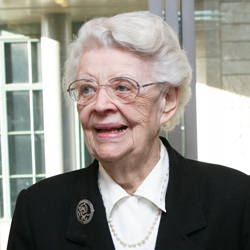Christina Enroth-Cugell, Distinguished Vision Scientist, Passes Away
Enroth-Cugell was heralded for her research on retinal ganglion cells in mammals
Christina Alma Elisabeth Enroth-Cugell, emeritus professor of biomedical engineering and neurobiology, passed away June 15 at age 96. She will be remembered as a renowned vision scientist, distinguished researcher, and compassionate colleague.
Arriving at Northwestern in 1955, Enroth-Cugell worked as a research fellow and instructor in the University’s Department of Ophthalmology before transitioning to the role of faculty in the Department of Physiology. In 1968, she began a joint appointment between the Weinberg College of Arts and Sciences and the McCormick School of Engineering and Applied Science, where she was one of the first female faculty members to teach engineering at Northwestern. She was an early faculty member of what became McCormick’s Department of Biomedical Engineering and Weinberg’s Department of Neurobiology, and served as chair of the Department of Neurobiology from 1984-1986.
 A celebrated researcher, Enroth-Cugell made several contributions to the areas of visual adaptation and the spatial and temporal aspects of receptive fields, and was at the center of the study of vision at Northwestern. Her lab, where she continued to play an active role well after her retirement in 1990, was a vital hub for producing many of today’s vision scientists.
A celebrated researcher, Enroth-Cugell made several contributions to the areas of visual adaptation and the spatial and temporal aspects of receptive fields, and was at the center of the study of vision at Northwestern. Her lab, where she continued to play an active role well after her retirement in 1990, was a vital hub for producing many of today’s vision scientists.
Enroth-Cugell’s research concentrated on the physiology of the mammalian retina, a passion that dated back to her time as a student at the Karolinska Institute in Stockholm, where she earned her PhD under Nobel Prize-winning scientist Ragnar Granit. Her particular interest in feline retinal ganglion cells led to her seminal research published in 1966 with collaborator John G. Robson. The study, which has been cited nearly 2,000 times, was one of the first to use systems analysis methods in vision, and it launched a field of study on parallel pathways in the visual system.
In 1983, Enroth-Cugell received the prestigious Jonas Stein Friedenwald Award from the Association for Research in Vision and Ophthalmology for her groundbreaking research and contributions to the study of visual physiology. In recognizing her for the award, Mathew Alpern wrote in the journal Investigative Ophthalmology & Visual Science: “The quality of her research and her supremely humane [compassion] have earned her friends and admirers among colleagues around the world.”
In addition to the Friedenwald Award, Enroth-Cugell was recognized with several notable accolades throughout her career. She received the inaugural Ludwig von Sallmann Prize at the International Congress of Eye Research meeting in 1982, as well as an honorary degree from the University of Helsinki. She also served as a member of the National Institute of Health’s National Advisory Eye Council, and was named fellow of the American Academy of Arts and Sciences. In 1994, she was inducted into the American Institute for Medical and Biological Engineering’s College of Fellows for “distinguished contributions to basic visual science.”
The Christina Enroth-Cugell Professor of Biomedical Engineering was named after her in 2008 and is currently held by professor Igal Szleifer. Most recently, she served as an executive council member of the Northwestern Emeriti Organization from 2002-2004.
Enroth-Cugell is survived by her husband David W. Cugell, a former professor of pulmonary medicine and the founding chair of the Division of Pulmonary and Critical Care Medicine in the Department of Medicine at Northwestern’s Feinberg School of Medicine.
Robert Linsenmeier contributed to this article